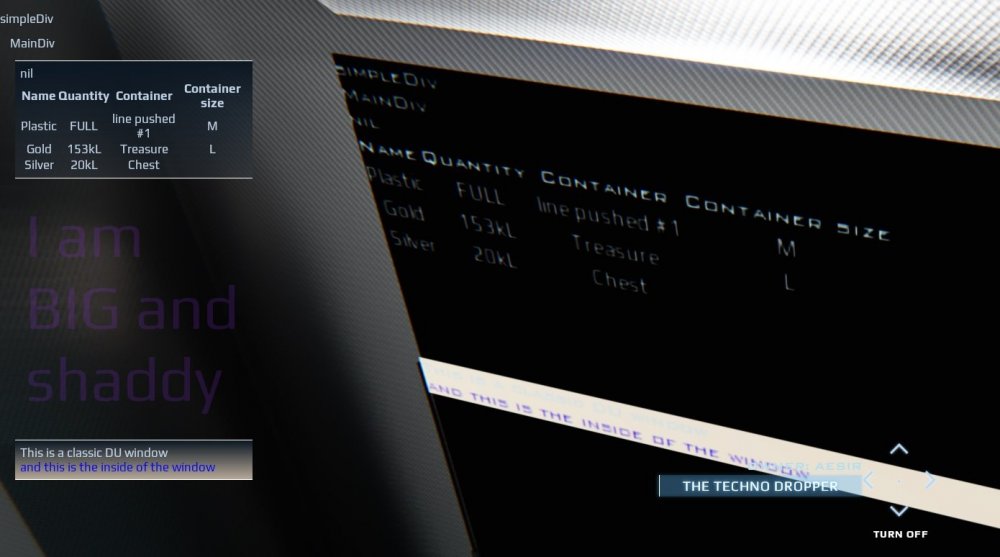Search the Community
Showing results for tags 'lua'.
-
I have been working on a script to construct HTML for those who want a simple tool yet quite powerfull I hope. The Idea is to have the script as a file in your Lua environement and just use the require() function, then start building your HTML. There is a demo at the end of the script (put the commented lines in your unit.start then uncomment them) HTMLhandler = require(HTMLhandler) HUD = HTMLhandler:Create(system) Features: The tool accept multiple monitors at once, like several screens or HUD (system). myHTMLhandler:Create(system,screen1) Simple usage: To get a simple window inside a left grid in your cockpit you can do: local myHTMLhandler = require("HTMLhandler") normalScreen = myHTMLhandler:Create(system) local baseGrid = myHTMLhandler:addDiv("", "left grid") local myWindow, myWindowContent = myHTMLhandler:addWindow(baseGrid, "MyWindow", "Inside the window") ---- change the content inside the window ---- local changeInside = "change the inside of the window" myHTMLhandler:updateContent(myWindowContent, changeInside) You can create a div with a string or a variable like that myHTMLhandler:createDiv(myVar) and it will display on the selected screen as long as the variable accept the tostring() conversion. You can pass in parameter custom style or/and class. There is also function to create a window and a table. At any time you can change the content as the "addx" functions returns a contentId. For the table, when created you get a table of contentId to modify the column's header and when adding a line you get a table of contentId to modify what's in the line. You can also delete a line or push a new line at the top of the table. indexSimpleDiv = myHTMLhandler:addDiv("simpleDiv") myHTMLhandler:addDiv(indexSimpleDiv, "anotherDiv in SimpleDiv") myHTMLhandler:deleteElement(indexSimpleDiv) -- the anotherDiv will be anchor into the simple Div, but once you delete the simpleDiv it will also delete its child, being "anotherDiv" mainDiv, contentIdMainDiv = myHTMLhandler:addDiv("MainDiv", "left grid") -- this will create a div with the content "MainDiv" and class "left" and "grid" local tableDiv = myHTMLhandler:addDiv(mainDiv, "", "window") -- create a div with the class window as NQ style (works only with HUD) local columnHeaders = {"Name", "Quantity", "Container", "Container size"} --define the title of the column's header for the table local simpleTable = myHTMLhandler:addSimpleTable(tableDiv, columnHeaders) -- create a table with headers local firstLine = {"Gold", "153kL", "Treasure", "L"} local firstLineId, firstLineContentId = myHTMLhandler:addSimpleLine(simpleTable, firstLine) -- add a first line local secondLine = {"Silver", "20kL", "Chest"} local secondLineId = myHTMLhandler:addSimpleLine(simpleTable, secondLine) --add a second line but without data in the last column local pushToFirstLine = {"Plastic", "FULL", "line pushed #1", "M"} myHTMLhandler:addSimpleLine(simpleTable, pushToFirstLine, 2) -- add a third line but at the top position in the table (1 being the headers) myHTMLhandler:updateContent(firstLineContentId[2], "20kL") -- change the amount of gold of "firstLine" Advanced usage: You can change the position of element, attach it to any other element, pass the class and the style in parameters, you can delete it and you can update the content. But it is also possible to do more advanced stuff like creating any HTML element template and use them by referencing them. It should also be possible to do svg tags like that : myHTMLhandler:defineElement("svg", '<svg height="100%" width="100%">', '</svg>') then use myHTMLhandler:addElement("svg",myContentInsideTheTag) The defineElement and the addElement accept variadic parameters so there is in theory no limit Another example, to make this '<line x1="939" y1="537" x2="957" y2="519" style="stroke:rgb(1, 165, 177);opacity:0.7;stroke-width:3"/>' being encapsulated as an element you can do: myHTMLhandler:defineElement("svgLine", '<line ', '" style="stroke:rgb(1, 165, 177);opacity:', ';stroke-width:', '"/> ') local content = 'x1="939" y1="537" x2="957" y2="519"' local svgLineId, svgLineContent = myHTMLhandler:addElement("svgLine", content, 0, '0.7', '3') 0 being a default postion value, if you want to change the position in a list of element (see above for the table). '0.7' the opacity and '3' the strokewidth. now you can change the content by using (by default it will rebuild the HTML and display it as soon as the function ends) : myHTMLhandler:updateContent(svgLineContent, 'x1="0" y1="12" x2="37" y2="24"') Note that multi-content is only availible for table for the moment. others functions: addWindow(Anchor, Title, Content, TitleClass, TitleStyle, ContentClass, ContentStyle, Pos) -- to build a window with the NQ style setAutoDisplay(boolean) setAutoCompute(boolean) -- for big HTML structure you might want to turn them off as every time you add element or edit content the HTML is rebuild and displayed compute() --build the HTML display() --display HTML on all the "monitors" computeAndDisplay() --straightforward getElementHTML(Index) -- to get just a chunk of HTML could be used to display just a part of the structure somewhere else I am aware that there is other tool to build HTML. If you find a bug please report it. If you need help, ask me (same name on discord and IGN) or in the #lua-scripting discord channel If you make your own design using the tool, consider sharing Special thanks to @hdparm ps: I'll put images when the server works pastebin instead of file: https://pastebin.com/KuMRGFFp create a file "HTMLhandler.lua" and save it at the root of lua folder as below
-
About This tool enables a somewhat different way of writing Dual Universe scripts. It takes a single Lua file that defines a global object with event handlers, and automatically generates a script configuration that can be pasted into a control unit. This allows writing the entire script outside the game, and automates away the need to manually set up each event handler. Prerequisites Some knowledge of Dual Universe Lua scripting (watch the official tutorial) Be able to run a Lua script from the command line. Download wrap.lua example-input.lua example-output.json Usage example Let's make a simple script that will react to key presses and display some text on a screen element. 1. Edit and save a Lua script in any plain text editor: -- Define a global script object with event handlers script = {} function script.onStart () -- Display some text screen.setCenteredText("script started") -- Create some timers to show that the script is working unit.setTimer("a", 2) -- timer id "a", ticks every 2 seconds unit.setTimer("b", 3) -- timer id "b", ticks every 3 seconds end function script.onStop () screen.setCenteredText("script stopped") end function script.onActionStart (actionName) screen.setCenteredText(actionName .. " key pressed") end function script.onActionStop (actionName) screen.setCenteredText(actionName .. " key released") end function script.onTick (timerId) screen.setCenteredText("timer " .. timerId .. " ticked") end -- Other events that are available by default: -- * onActionLoop(actionName): action key is held -- * onUpdate(): executed once per frame -- * onFlush(): executed 60 times per second, for physics calculations only; setEngineCommand must be called from here -- Slot events are available if slot type is set with the --slot command line option. function script.onMouseDown (x, y) screen.setCenteredText("mouse down: x=" .. x .. " , y=" .. y) end -- Call the start event handler -- Alternatively, initialization code can be placed anywhere in this file. -- The only requirement is that there is a global "script" object with event handlers script.onStart() Note: sometimes invalid characters are added when copying code from forums. If that happens, copy code from the provided link instead. 2. Run the packaging script: lua wrap.lua yourscript.lua yourscript.json --slots screen:type=screen --handle-errors --slots screen:type=screen sets first slot's name to screen and adds mouse down/up event support for that slot. --handle-errors adds error handling code, so that run-time Lua errors are displayed on the screen and in the Lua tab. 3. Open the resulting configuration file in a text editor, and copy everything to clipboard. 4. Inside Dual Universe, prepare a construct. There must be a programming board and a screen, and the screen must be linked into the programming board's slot 1. 5. Right-click on the programming board, select "Advanced", "Paste Lua configuration from clipboard". Done! The DU construct has been programmed without opening the in-game editor once. Activate the programming board and see if it works. Command line arguments Command line examples To produce a pasteable configuration for a custom piloting script: lua wrap.lua pilot.bundle.lua pilot.bundle.json --slots core gyro container_0 screen verticalEngine To produce a pasteable configuration for a radar script: lua wrap.lua radar.bundle.lua radar.bundle.json --handle-errors --default-slot type=pressable To produce an autoconf file for another custom piloting script: lua wrap.lua flight-enhancednav.bundle.lua flight-enhancednav.conf --output yaml --name "Airplane Cockpit (Enhanced)" --slots core:type=core gyro:type=gyro container:type=fuelContainer,select=all --handle-errors Known issues "Root node should be a map" This error is caused by wrong .conf file encoding. If you are using Powershell, the > operator saves the output with UCS-2 LE BOM encoding. Use cmd.exe instead, or replace > my.conf with | Out-File -Encoding UTF8 my.conf, or do not use output redirection, as the output file name can now be specified as an argument. Change log 2020-09-04. Posted the first version outside the NDA forums section. Output can now be written to a file without using output redirection. Credits This tool uses argparse and dkjson libraries, and was bundled using amalg.
-
How can i change the item my refiner is producing? I only found the different starting and stopping methods in the Help(F1) documentation. Do i really need to setup multiple refiners to get all ores automated? That would be heavy on the already poor performance.
-
This is the output of a script that dumps all global variables. Lua coders may find this somewhat useful. The script was run in r0.21.2 on a hovercraft seat that has 2 fuel tanks and a radar linked. Some functions were called with pcall. The first value indicates whether the call was successful, the second is the actual return value or the error message. To see only elements' functions, visit this topic. Dumping script The script used for dumping is based on something I found on Stack Overflow, with some extensions. In unit start(): https://gist.github.com/d-lua-stuff/180707c172382d06d2c80213a1638f66 In system update(): coroutine.resume(dumping_coroutine) The script will run for a few seconds and then automatically turn off. Output is saved to Dual Universe 's log files in %LOCALAPPDATA%\NQ\DualUniverse\log Dump analyzer To avoid having to look through the logs manually, a Python script was written. It extracts the output of the globals dumping script from Dual Universe's log files, and creates separate files for dumped globals and for members of each linked element. Usage: pip install six python dump_analyzer.py C:\Path\To\Log\File.xml Change log 2020-09-01. Posted the first version outside the NDA forums section.
-
As a future developer in Dual Universe, the idea of DACs as payment seems like an interesting prospect. But the more I think about it, the more it seems like a bit of a d-bag move on the part of the developers. I don't want this to be an overtly negative post, but bear with me.. I intend to be creating a whole lot of stuff in game, ships, defenses, tools, etc. with full Lua scripting to back them all up. These things will take a TON of time to develop if you hope to have a decent result from them. However, with the Dual Access Coupons being the only *real* form of payment I can hope to receive in game, it kind of feels like a bit of a face slap. Think about it. I spend 25 hours working on a super awesome engine control module with advanced auto-maneuvering for someone who requested it custom. Joe Space Captain goes to the Dual website and buys himself two DACs to give to me as payment for the work I did. Great, I got this month and next in game for free as payment. = 30 Euro savings or whatever for me. Now, instead of a custom job, I make a super awesome base turret blueprint that I sell on open market. Let's say 250 people buy it at 500 credits each, and I trade those 125,000 credits for 5 DACs that people are selling on the market. What happened here? I now have 5 free months in game, which I may or may not ever use, but NovaQuark just made 75 euro in real money cash for all of that work that I did. Once I start collecting DACs like candy because now 10,000 users have realized how good it is and have purchased my super-awesome turret, NQ is rolling in the money for work I did, and those DACs I accrued have become virtually useless to me. Obviously, I made assumptions the monthly fee is 12 euro and DAC are 15 euro. Actual cost doesn't really matter. The more I make and sell on market, the more trivial the DACs will become. Meanwhile, NQ makes tons of constant value cash on my work. My alternative would be to just hoard the in-game currency, which has equally nil real-world value. I have to imagine that with this system of payments, serious developers and builders will eventually just start dealing outside of the game and make contracts to do in-game work with payments in real cash. That's the only way it would actually be worth it to build things over the long term. All of the really good stuff in game will only be accessible through various user-run black markets outside of game, with in-game market only used for trivial purchases just to get items transferred and to earn the in-game money needed for resource accumulation. I could be wrong, but that's what I foresee happening. What are your thoughts?
- 28 replies
-
- dual access coupon
- dac
-
(and 3 more)
Tagged with:
-
So I was wondering. We will be able to script in LUA, which is pretty cool. But what if we were able to have databases as well to store and fetch data? Think about the world of programming it would open : statistics, history, logging, stock situation of a warehouse, forecast... basically all information-based services! It could be done with a database element that would whether : - Connect to a reserved database on NQ servers, one on each account to which you could assign rights (to allow organizations to use it) - Connect to an external database on the user's PC or on online. Thoughts?
-
I know that "predefined sounds" is on the "Considered" list on Trello: https://trello.com/c/HVdTjEsH/51-functional-scriptable-speakers-able-to-play-predefined-sounds While I think that would be cool, I think it would be cooler if we had access to a synth sound module through LUA to build and sequence our own custom sounds. Writing sound synthesis by hand isn't unheard of in LUA, for example: And even more, here are some tracks composed entirely with LUA: https://soundcloud.com/luehi/systemf https://soundcloud.com/luehi/luacid1 https://soundcloud.com/luehi/early https://soundcloud.com/luehi/selfkitchen https://soundcloud.com/luehi/luaessay5 https://soundcloud.com/luehi/movk I think that giving us the flexibility to define our own sounds with such an approach would be incredibly more valuable than choosing from a list of predefined sounds. In case anyone is wondering, yes I am suggesting this because I want a night club in DU.
-
Hey, will there be a kind of Database? Or maybe just a storage for Plain text? If not, please integrate it!!! It would offer so many cool things ! The second idea that i have would be a Networking System between single stations. Further it would be nice to have a quantum cummunicator (for the LUA machines) to communicate beyond planets.
- 4 replies
-
- progamming
- lua
-
(and 2 more)
Tagged with:
-
Is there a lifespan to how long a variable in Lua will retain its value in memory, or with this being a 'persistent universe' do variables never lose their value once assigned?
-
The devs have said that automated mining will probably not be an option. As a student of business and economics, here's what I think: ABSTRACT: Limiting script automation for both mining and weapons fire will greatly limit the capacity for economic growth and in-game innovation. The mining industry, for example, will start out with individuals mining for minerals and directly selling them to other players or on an open market. It will eventually evolve into a number of mining corporations that will be able to provide minerals more cheaply through an organized workforce and semi-automated processes. This is inevitable, as it should be. But why limit the mining industry to this level of business innovation? By disallowing further automation, yes, the market for mundane repetitive tasks like mining by hand will be preserved. But what would happen to the broader job market in a simulated economy where automation is unregulated? It would expand exponentially. How would automated mining exponentially expand economic growth and job availability? Well, the whole purpose of automation is to reduce labor costs, to reduce the price of goods (raw minerals, in this case), so that, in a competitive free market economy, businesses can stay... competitive. Inevitably, reducing the price of raw minerals allows other businesses, further up the chain of production, to increase production and lower their prices (competitive market, remember). These reduced prices further up the chain of production lead to increased demand and, therefore, new market opportunities. STORY TIME: John Smith is a miner. He mines steel all day for Mineral Corp, gets a commission based on how much steel he mines, and Mineral Corp sells the steel to spaceship manufacturing facilities. One day Mineral Corp decides to cut costs by using automated mining drones. Nooooo!!!! Curse you Human Ingenuity!! Let's look at what just happened: In order to cut costs, mining corporations are now buying automated mining drones. This new demand for drones is providing jobs for programmers, industrial designers, manufacturers, and even truckers (to transport all the extra minerals that are being more cheaply produced and are increasingly in demand by all these industries)! Back to John Smith: John lost his job to robots. The Luddite fear that soulless computers will replace all the honest employees has come true! *cough cough* But when John's at home, drinking away his sorrows with some Pan Galactic Gargle Blaster, he opens up the classifieds and is shocked to see hundreds of jobs available that weren't there yesterday! Not only jobs related to the production of mining drones, but many seemingly unrelated jobs! Where did these other jobs come from? They came from the steel being cheaper. Businesses that use that steel for product production, like spaceships and buildings, can now sell their products more cheaply. Having cheaper spaceships increases the demand for spaceships because more people can afford them. In order to meet that increased demand, spaceship manufacturers must increase their production by hiring more employees (new jobs! Yay!). So now, even though less people are mining by hand, more people are building spaceships (as well as countless other things)! John Smith may not be mining anymore, but he has a new job now, that pays more, and he can enjoy a cheaper cost of living thanks to those beautiful automated mining drones. BASIC FORMULA: Automation = reduced cost. Reduced cost + competition = reduced price. Reduced price = increased demand. Increased demand = increased production. Increased production = increased job availability. Automation + competition = increased job availability. Can we please have free automation scripting? (I may touch on automated weapons-fire later)
- 80 replies
-
Can you not use the CHROME instead of the IE or EDGE standard for the HTML standard? Because there are many more possibilities and Microsoft also wants to change to the CHROME standard in the future.
-
Hey everyone, a few minutes ago, someone asked a question on the official Discord: "How are services going to work in the game, can you have an automated service charge you [...] Like say you have automated buses" That's when I had the idea of a programmable payment terminal. It would be a device that you can place down and customize what it does on interaction. Does it allow donations? Does it pay out some quanta ever so often? Does it request a payment of some amount? On a successful payment it could output a logic signal or do something more complex using LUA. I think we need some way to automate ingame payments, and I think a programmable payment terminal/interface would be an awsome way of achieving that. Just tell me what you think about it!
-
Would be fun to have a device allowing you to edit other organizations' Lua scripts or re-wire their components. This would open up many possibilities like having spies or stealth commandos preparing an attack with traps and sabotage.
-
I've been thinking a lot about communication with other players not associated with the character. Perhaps you can add a function that could send limited text messages to the designated ship which displays it on UI. In that way you could have a ship or station constantly sending out messages like "Restricted area" or "Open for buisness" Anyway it's just an idea of mine, tell me what you think.
-
To accomplish this some changes would be needed. The goal of these changes is to allow the automation of selling vehicles. To accomplish this permission should be able to be changed with Lua scripting. In order to automate selling a ship, the Lua scripting would change permissions once the buyer has completed the correct input (paying for the ship). On top of these changes there needs to be a permissions added that allows someone to fly and build on a structure but not be able to blueprint the structure. Otherwise you could spend hours designing a ship, sell one, and then watch everyone blue print hundreds of them without getting an in game dime. This could be accomplished 2 different ways. Method one don't allow blue printed ships to be blue printed. Only the original ship can be blueprinted. Method two add a second permissions type for blueprinting. Selling ships would be difficult and probably pointless without these features.
- 3 replies
-
- permission
- lua
-
(and 3 more)
Tagged with:
-
Would be cool to see an LUA scriptable method to accept or give currency to a player. Good way to collect taxes for city functions for example. It also creates several markets in the service industry.
-
I suggest having multiple coding language editing boards in case we can't fins a way to learn Lua before the game release. There are not a lot of online resources for learning Lua, and any of the websites that would potentially have Lua don't. I'm saying that we could keep Lua, and we could also have other languages for people to edit if they aren't knowledgeable of Lua (myself included).
-
Suggestion to add sound devices In DU you can present visuals using html, svg, widgets, but when it comes to audio, things are not so bright. Sound is important if you want players to be able to make games. Sound can play role in interfaces, used for alarms and, of cource, playing music! So I propose adding to the game lua-controlled "SPUs"/"sound devices"/"sound units", that will allow players to do all kinds of stuff - from simply playing sound on notification in theyr programs to implementing sound effects in the game, or even creating sound trackers and sequencers (to then create music in it). sound device: -has sound memory consisting of, say 44100*8 bytes (number depends on sound device tier), which that can be read as integers using get_sample, set_sample. -has 8 channels (also depends on sound device tier). each channel can be set to play samples from area in audio memory or use oscillator. Each channel can have 1 siimple filter on it. sound device api: sound memory manipulation functions: samples_count(sample_depth) - returns how much integer values of size sample_depth in bytes sound memory can hold get_sample(sample_depth, sample_index) - interpreting sound memory as array of signed integer numbers consisting of sample_depth bytes return sample_index'th integer number from this array. sample_depth can have value 1, 2, 4, 8. On any other value get_sample returns nil sample_index wraps around if higher than number of integers in array set_sample(sample_depth, sample_index, new_value) - interpreting sound memory as array of signed integer numbers consisting of sample_depth bytes set sample_index'th integer number to new_value. getNSamples(sample_depth, sample_index, N) - same as get_sample, but instead of getting 1 integer value it returns table consisting of N values from audio memory starting from position sample_index. Can be merged with get_sample setNSamples(sample_depth, sample_index, new_value) - same as set_sample, but instead of setting 1 integer value, it sets #new_value samples to values from new_value table starting at position sample_index channel control fuctions: channels_count() -returns number of channels sound device has channel_set_sound_source_memory(channel_num, sample_depth, sample_rate, start, end, loop) -set channel to play sound from sound memory channel_set_sound_source_osc(channel_num, type, frequency, osc_param) -type is string - "noise", "sin", "tri", "square". triangular and rectangular waveforms take 1 more paramenter for rate channel_set_volume(channel_num, new_volume, time, delay) - sets channel volume to new_volume. If time arg is provided, volume will be changed gradually in time milliseonds (if not interrupted by another set_volume command). If delay arg is provided, volume change start will start in delay milliseconds after this command called. channel_set_pan(channel_num, new_pan, time, delay) - sets channel pan to new_pan. 0 is left, 1 is rigth, 0.5 is center channel_set_pitch(channel_num, new_pitch, time, delay) channel_start_note(channel_num, delay) - starts note on channel. start is delayed for delay milliseonds, if delay parameter provided. If other note was playing on this channel, it ends. channel_end_note(channel_num, delay) channel_set_filter_type(channel_num, type, delay) - filter types are "none", "highpass", "lowpass", "comb", "bandpass" channel_set_filter_base_frequency(channel_num, freq, time, delay) channel_set_filter_gain(channel_num, gain, time, delay) - in dB, if applicable to filter channel_set_filter_param(channel_num, param_num, param_amount, time, delay) - filter-specific params, such as resonance for "highpass" or "lowpass", bandwidth for "bandpass"
-
So, it is baxically established that complete automation will be purposely nade impossible. (No fully automated luxury gay spacr communism for you), but that there will still be lua scripting. However, I imagine parts such as warp drives, TCU units, cockpits, etc will already have some sort of software that we keep quite about to automate some of the processes that run in the part. But what if we didn't do that and force everyone to use mechanical controls and have to control every little thing (no fly-by-wire for instance) or write their own firmware to operate them?
- 10 replies
-
- automation
- scripting
-
(and 1 more)
Tagged with:
-
Hi DU Community, I can envision the possibility of large corporations investing in the development of merchant AI (bots) using LUA scripting to interface with the various trade markets, perform analysis and make real-time automated buy/sell decisions based on a set of pre-defined objectives (minimize risk, maximize ROI, etc..) have we received any insight into what type of database architecture will be supporting the DU economy, is it going to be possible via API's or in-game interfaces for players to perform analysis and make informed data-driven decisions or will this type of thing be more of an external metagame? It would be ideal if players could download (in-game) trade/market data from the station/hub they are in to their ships computer which will be a repository for all the analytics described above - this could open the possibility of trading in data/information, for example the more stations you visit (and the more frequently you visit them) the more up-to-date your data assets will be etc.. in-game systems could emerge to enable (data storage, computing power, analysis, data protection, hacking, long-range data relay) other forms of data may include: obviously blueprints scripts/AI (running on-board) trade data (what you've purchased/sold) cargo manifests (historical record) station logs (where you've docked) comms logs (who you've communicated with) Any of this in the works?
-
I understand that intellectual property in terms of blueprints will be protected, but what about Lua scripts? From what I've seen, they can be edited easily in game. What if I want to design a ship with a Lua script as its main selling point? Can another player steal my script if they buy a ship from me?
-
This question came to my mind when I saw that many organisations created their own website page and discord server with bots linked to our account on DU website. Will it be possible to send information outside the game with Lua language or Html css ones. For exmple when someone activate a button it could send a message to a particular discord server. Or reverse, a certain action on a server could lead to a message in the game. However I know there will be terrible security issues in this case. But I wanted to know if something similar would exist.
-
So I am wondering how to approach this idea. I have a construct that is running a script. The construct has 20 doors. The script wants to open or close each of the doors individually. A relay is not appropriate, because I don't know before hand which of the doors will be open or closed, so I can't do fixed wiring. I have not been able to confirm if a Control Unit will be able to handle 20+ Out Plugs from one unit or script. There seems to be a limit of 1 to other Emitting Elements. Any one have any other insights on this? I am using the published dev blogs etc as reference here. Can't wait for pre-alpha to start so I can toy around with this
-
I would like to see more ideas based on automation. So far, I've seen JC talk about having a large number players working together... Obviously, JC doesn't watch SAO, sometimes you gotta solo... I mean, If I built a large ship with guns, I want to be able to fly it on my own, without having to ask a stranger to come on board and touch my stuff.
-
How much do you plan to script in-game and what experience do you have?








(1)(1)(1)(1)(1)(1)(1)(1).thumb.png.c773b1e39c1958ea50a83f6e35520029.png)










